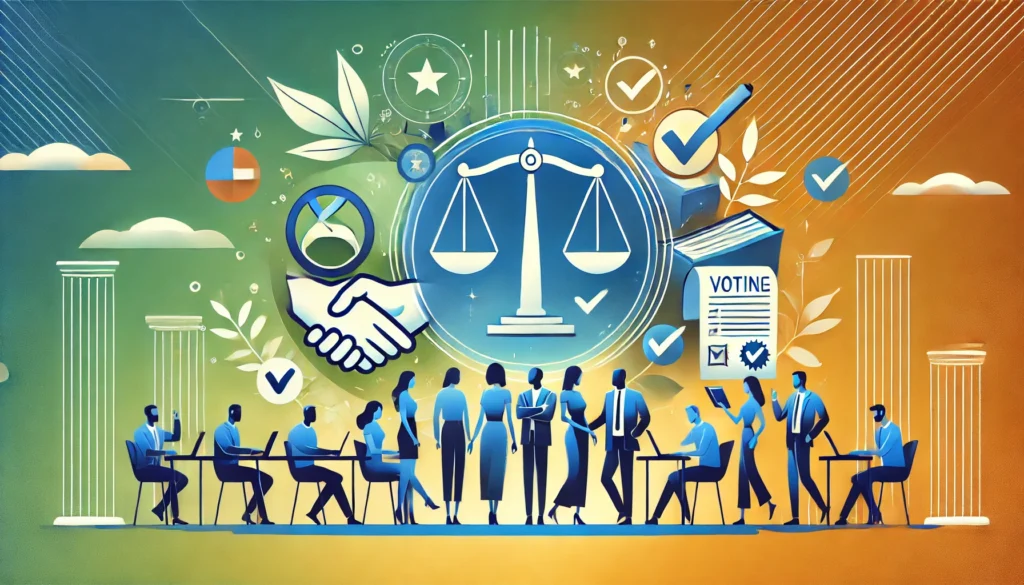Democracy as a Catalyst for Collective Ethical Evolution
In today’s interconnected and rapidly transforming world, democracy serves not only as a governance model but as a powerful engine for shaping and evolving our collective values. Democracy empowers societies to engage in open dialogue, foster diverse participation, and enable value-driven decision-making. From the Wisdom Accelerators perspective, democracy is a fundamental accelerator of societal wisdom, ethical consciousness, and adaptive cultural evolution.
The Dynamic Feedback Loop Between Democracy and Values
Democracy Reflects Societal Aspirations
Democracy is often described as a mirror reflecting the aspirations, struggles, and evolving priorities of the people it serves. Through elections, public debates, civic activism, and social movements, democratic societies provide platforms where diverse worldviews, ethical frameworks, and emerging priorities meet, compete, and collaborate. These participatory processes allow societies to continuously update their collective moral compass in alignment with the needs of their citizens.
An Adaptive System for Evolving Values
Unlike rigid or authoritarian systems, democracy supports the emergence of adaptive value systems. Societies that thrive under democratic principles possess the capacity to redefine concepts such as justice, equality, freedom, and human rights in response to shifting societal conditions, technological advances, and global crises. This capacity for reflection and redefinition enhances societal resilience, enabling communities to adjust to uncertainties while nurturing a culture of civic innovation and ethical experimentation.
How Democracy Shapes Key Collective Values
Fostering Freedom of Expression and Dialogue Culture
At the core of democracy is a dialogue culture rooted in the freedom of expression. This openness allows individuals and communities to voice opinions, challenge conventional norms, and propose innovative alternatives. Such democratic discourse nurtures creative thinking, critical analysis, and ethical debate, all of which are essential for nurturing societal wisdom and encouraging value-driven decision-making.
Advancing Inclusivity and Social Equity
Democracy creates pathways for marginalized groups to gain representation and participate in decision-making processes. By enabling diverse voices to be heard, democratic systems drive progress toward gender equality, minority rights, and social justice. Over time, these practices embed values of inclusion, diversity, and empathy into the cultural DNA of societies, ensuring that no group is left behind in the journey of ethical evolution.
Reinforcing Transparency, Accountability, and Public Trust
Transparent institutions, free press, public oversight mechanisms, and participatory governance practices form the backbone of democratic systems. These elements foster public trust, reinforcing societal values of honesty, fairness, and responsibility. Accountability processes ensure that citizens remain engaged in holding leaders, businesses, and institutions answerable for their actions, thereby nurturing a culture of ethical governance and institutional integrity.
The Wisdom Accelerators Perspective: Democracy as an Engine for Ethical and Civic Evolution
From the lens of Wisdom Accelerators, democracy is not simply a structure for governing societies; it is an evolutionary catalyst for accelerating collective ethical intelligence. By creating safe, open, and inclusive spaces for citizens to reflect, contest, and negotiate their values, democracy becomes an enabler of societies that are future-ready, self-aware, and compassionate.
Facilitating Intergenerational Dialogue and Wisdom Transfer
Democracy provides platforms where generational wisdom intersects with youthful innovation. Intergenerational dialogue in democratic settings ensures that societal values are continually updated while remaining grounded in historical lessons. This blending of perspectives allows societies to maintain balance and adaptability, while remaining rooted in principles of justice, dignity, and cooperation.
Enhancing Societal Self-Awareness and Ethical Reflection
Through civic mechanisms such as referendums, protests, citizen assemblies, and public consultations, democracy enables societies to confront their contradictions, biases, and blind spots. These participatory platforms allow citizens to reflect collectively, fostering self-awareness and empathy that feed into the continuous refinement of societal values.
Challenges and Opportunities in the Digital Age
The digital era has expanded the reach and speed of democratic discourse, introducing both challenges and new frontiers for value shaping. While social media, AI, and digital platforms can amplify democratic participation and civic engagement, they also risk creating polarization, echo chambers, and misinformation.
To address these challenges, democratic societies are exploring digital literacy programs, ethical technology governance, and civic tech innovations that facilitate participatory policymaking and community dialogue in virtual spaces. These emerging tools ensure that democracy remains agile, relevant, and resilient in the face of 21st-century complexities.
Democracy as Humanity’s Wisdom Accelerator
Democracy remains humanity’s most adaptable and potent mechanism for refining values, accelerating collective wisdom, and nurturing ethical civilizations. By inviting diverse voices into transparent, inclusive, and reflective decision-making processes, democracy enables societies to align their collective values with evolving human needs, planetary challenges, and global opportunities.
At Wisdom Accelerators, we see democracy as not only a system of governance but as an ever-evolving space where wisdom, empathy, and ethical progress are continuously nurtured for the benefit of present and future generations.

